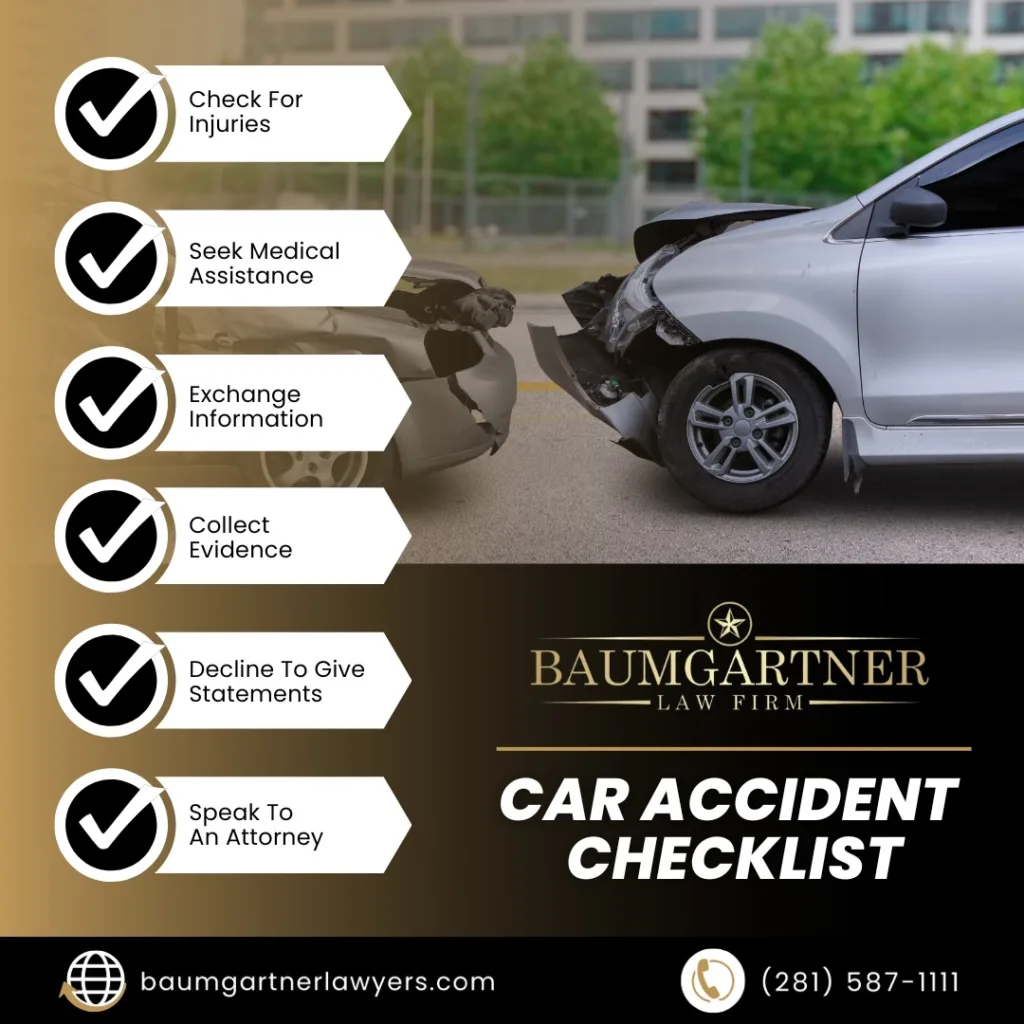When Does a Car Accident Go to Court?
When does a car accident go to court? Car accidents typically go to court when disputes arise over who is at fault, inadequate settlement offers are made, or severe injuries occur. While most accidents are settled outside of court, this article will help you understand the situations that might push your case into the courtroom and what to expect if it happens.
- Most Houston car accident claims are resolved outside of court, with litigation primarily occurring due to disputed liability, inadequate settlement offers, or serious injuries.
- Promptly filing a car accident claim, gathering substantial evidence, and hiring an experienced attorney can significantly enhance the chances of reaching a favorable settlement without the need for court involvement.
- Understanding the statute of limitations and acting quickly is essential to protect your rights and ensure a smoother claims process for potential compensation.
Understanding Car Accident Claims

Car accident claims are the first step toward seeking compensation for damages and injuries sustained in an accident. While it might seem daunting, it’s important to know that most car accident claims are resolved outside of court, with only a small fraction of car accidents ever reaching the courtroom.
The key to a successful claim lies in understanding the process and knowing when and how to take action. Whether it’s dealing with the insurance company, negotiating settlements, or, if necessary, preparing for a court case, each step requires careful consideration and strategic planning.
Filing a Car Accident Claim
Filing a car accident claim is crucial in seeking compensation for your losses. The process begins with gathering evidence, such as photos of the accident scene, witness statements, and police reports. This evidence will be essential in proving your case and establishing fault. Once you have all the necessary documentation, you must formally notify the insurance company of the accident. This notification initiates the claims process and is crucial for protecting your rights.
Having experienced car accident lawyers handle the communication with the insurance company can make a significant difference. They can navigate the legal jargon, protect your interests, and ensure you receive fair treatment.
Promptly reporting the accident and gathering substantial evidence strengthens your chances of a favorable outcome. Remember, the sooner you file your claim, the smoother the process.
Settlement Negotiations
Settlement negotiations play a crucial role in car accident claims. Most claims are resolved out of court due to the efficiency and certainty of mutual agreements. The process usually begins with a demand letter, where you outline the compensation you seek for your damages and injuries. This initial offer sets the stage for negotiations between you and the insurance company.
However, achieving a fair settlement can sometimes be challenging. Insurance companies often aim to minimize their payouts, which can lead to disagreements over compensation. If the insurance company’s offer is insufficient, you might consider litigation. Having a personal injury attorney who can advocate for your rights and push for a fair settlement. In some cases, if negotiations fail, filing a lawsuit becomes necessary to ensure you receive the compensation you deserve.
Once a settlement is reached, both parties must sign documentation to finalize the agreement. This step is crucial because it prevents further claims for the same incident. The fund should be disbursed on an agreed-upon timeline.
Settlement negotiations require patience and a clear understanding of your rights and entitlements. With the right legal guidance, you can navigate this process effectively and avoid the stress of a prolonged legal battle.
Common Reasons Car Accident Cases Go to Court
While most car accident claims are resolved through settlements, some cases inevitably go to court. Understanding the common reasons behind this can help you prepare and avoid litigation. Disputed liability, insufficient settlement offers, and serious injuries or fatalities are among the primary factors that push car accident cases into the courtroom.
Each scenario presents unique challenges that often require legal intervention to resolve.
Disputed Liability
Disputed liability is a frequent reason why car accident cases go to court. When both parties contest who is at fault, presenting evidence before a judge or jury often becomes necessary. In such cases, the plaintiff must prove that the defendant is more likely than not responsible for the accident. This can involve presenting eyewitness accounts, expert testimony, and other evidence to support your claim.
Without clear evidence, the chances of settling diminish, and the case will likely proceed to trial.
Insufficient Settlement Offers
Insufficient settlement offers from insurance companies are another common reason car accident cases go to court. Insurance companies often aim to limit their payouts, presenting low offers that do not adequately cover the damages and injuries sustained. When a plaintiff rejects these offers in hopes of securing a larger jury award, litigation becomes a viable option.
This underscores the importance of having a skilled attorney who can negotiate for a fair settlement and advise you on the best course of action.
Serious Injuries or Fatalities
Serious injuries or fatalities resulting from a car crash often necessitate going to court to secure fair compensation for car accident victims. Cases involving catastrophic injuries or wrongful death typically have higher claim values, which complicates settlement negotiations. The surviving loved ones of a wrongful death may file a lawsuit to seek compensation for their loss.
In such instances, achieving a fair settlement outside of court can be challenging, making litigation necessary to ensure justice and adequate financial recovery.
What Happens During a Car Accident Lawsuit?
When a car accident case goes to court, it indicates that both parties couldn’t settle through negotiations. The legal proceedings involve presenting evidence, calling witnesses, and arguing before a judge and jury.
Both sides have the opportunity to present their case, and the complexity of the process requires substantial preparation and legal maneuvering. The trial process ensures that each party can present their evidence and arguments fairly.
The Complaint and Response
The first step in initiating a car accident lawsuit is filing a formal complaint against the defendant. This is called Plaintiff's Original Petition in Texas and outlines the damages being sought, both economic and non-economic, and officially puts the defendant on notice. Once filed, the defendant can respond to the allegations, which sets the stage for the ensuing legal battle.
The complaint and response establish the court’s jurisdiction and frame the issues to be resolved.
Discovery Phase
The discovery phase, the first stage of a civil lawsuit, requires both sides to exchange evidence. This process includes depositions, where witnesses give testimonies under oath, and interrogatories, which help clarify the case details. Attorneys review these testimonies and may schedule additional depositions to gather more information.
The discovery phase is essential for uncovering the facts and building a strong case before the trial begins.
Trial Proceedings
The trial process for a car accident case involves several critical steps. It begins with jury selection, where potential jurors are evaluated and challenged to ensure an unbiased trial. Opening statements follow, with both sides summarizing their evidence and outlining their arguments. During the trial, evidence is presented, witnesses are called, and cross-examinations are conducted to support each party’s claims.
After all the evidence and testimonies are presented, the jury deliberates to reach a verdict. The jury’s decision can result in financial compensation for the plaintiff if they find in their favor. The judge then formalizes this verdict into a legal judgment, concluding the trial proceedings.
The trial process can be lengthy and complex, but it is designed to ensure a fair and just resolution of the case.
How to Avoid Going to Court
Avoiding court proceedings can save time, money, and stress. Most car accident claims are resolved through negotiated settlements, highlighting the importance of effective negotiation strategies. By building a strong case, hiring an experienced lawyer, and considering alternative dispute resolution methods, you can increase your chances of reaching a fair settlement without needing a courtroom trial.
Building a Strong Case
Gathering comprehensive evidence, including eyewitness accounts, photographs, and police reports, is vital for proving your claim and demonstrating damages. Medical bills, income statements, and expert testimony can further substantiate your case.
The stronger your evidence, the more likely you will achieve a favorable settlement without going to court.
Hiring an Experienced Car Accident Lawyer

An experienced car accident lawyer navigates the complexities of claims and negotiations, advocating effectively for fair compensation.
Informing your attorney about your reluctance to go to court can help them strategize accordingly, aiming for a satisfactory out-of-court settlement. This approach can save you the time and stress associated with a trial.
Mediation
Alternative dispute resolution (ADR) methods, such as mediation, can help avoid lengthy court processes. Mediation involves a neutral third party facilitating a mutually agreed-upon agreement.
Timeline Considerations for Car Accident Claims
Filing a car accident claim promptly is essential to avoid losing your right to compensation. Awareness of the statute of limitations is important, as prompt action prevents complications and ensures efficient handling of your case.
Understanding these timeline considerations is crucial for protecting your rights and securing the compensation you are entitled to.
Statute of Limitations
The statute of limitations for filing a car accident claim varies by state, and in Texas, the statute of limitations is two years from the date of the accident.
Awareness of these deadlines ensures you don’t lose your right to seek compensation.
Prompt Filing
Promptly filing a car accident claim can significantly affect the overall process and outcome. Delays can make it more difficult to gather evidence and settle the claim promptly. Submitting your claim on time can prevent complications and ensure a smoother claims process.
Filing promptly is key to achieving a favorable resolution in your car accident case.
Importance of Legal Representation
After a car accident, having legal representation is essential. They safeguard your rights and help ensure you receive full compensation. An experienced lawyer can help you navigate the complexities of the legal process, from negotiations to court proceedings. Without legal representation, claimants may face significant setbacks and be taken less seriously by the legal system.
A skilled attorney can make all the difference in achieving a successful outcome in your car accident case.
Benefits of a Personal Injury Lawyer

Promptly hiring a personal injury lawyer meets filing deadlines and ensures proper handling of your case. A knowledgeable attorney can counter insurers’ bad-faith tactics and advocate for fair treatment.
Securing an effective lawyer increases your chances of achieving a fair settlement and receiving deserved compensation.
Contingency Fee Basis
Many car accident lawyers operate on a contingency fee basis, meaning they only charge clients if they win compensation. This arrangement makes legal help accessible to everyone, regardless of their financial situation, because you don’t have to worry about upfront legal fees.
It also aligns the lawyer’s interests with yours, as they are motivated to secure your highest possible compensation. With a contingency fee basis, you can focus on your recovery while your lawyer handles the complex legal matters.

Summary
Navigating the aftermath of a car accident can be daunting, but understanding the claims process and when a case might go to court can make a significant difference. Each step requires careful consideration and the right legal support, from filing a claim and negotiating settlements to potentially facing a trial. Building a strong case, hiring an experienced personal injury lawyer, and considering alternative dispute resolution methods can often help avoid the stress of court proceedings. Ultimately, taking timely action and securing legal representation are crucial in obtaining fair compensation and protecting your rights.
Car Accident Go to Court FAQ’s
Why do some car accident claims go to court?
Some car accident claims go to court due to disputed liability, inadequate settlement offers, and the presence of serious injuries or fatalities. These factors often necessitate a legal resolution to achieve a fair outcome.
What is the first step in filing a car accident claim?
The first step in filing a car accident claim is to gather evidence and promptly contact the insurance companies. This ensures that your claim is processed efficiently and accurately.
How can I avoid going to court for a car accident claim?
To avoid going to court for a car accident claim, focus on building a strong case and consider alternative dispute resolution methods like mediation. Hiring an experienced lawyer can also significantly enhance your chances of settling the claim amicably.
What happens during the discovery phase of a lawsuit?
During the discovery phase of a lawsuit, both parties exchange evidence, including depositions and interrogatories, to build their cases. This process is crucial for uncovering relevant facts and preparing for trial.
Why is legal representation important in car accident cases?
Legal representation is essential in car accident cases as it enhances the likelihood of obtaining fair compensation through effective negotiation and thorough evaluation of claims. Having an attorney can make a substantial difference in the outcome of your case.
Contact the Houston personal injury law firm of Baumgartner Law Firm at (281) 587-1111.
Baumgartner Law Firm
6711 Cypress Creek Pkwy
Houston, TX, 77069
Visit Our Law Firm in Houston
Related Resources:
When to Get an Attorney for a Car Accident
How to Negotiate a Settlement with an Insurance Claims Adjuster
For a FREE Consultation Contact Us Today
"*" indicates required fields
Related Links
Our Experienced Houston Personal Injury Lawyer Can Help!
Case Results
$5,750,000.00 Truck Accident - Wrongful Death
$6,000,000.00 Daycare Injury
Confidential Settlement Commercial Vehicle Crash - Wrongful Death
Confidential Settlement Burn Injury
Confidential Settlement 18-Wheeler Accident - Wrongful Death
Legal Services
Contact the Auto Accident Lawyer
at Baumgartner Law Firm for Help!
Contact the Houston car crash law firm for help with a personal injury claim.
OR
Fill out an online consultation request for a FREE consultation.
Related Resources
- Texas Personal Injury Lawyer Near You
- Who Gets the Money in A Wrongful Death Lawsuit In Texas?
- Motorcycle Accident Lawsuit Settlement Factors
- How Do Personal Injury Attorneys in Texas Get Paid
- Contingency Fees in Houston Personal Injury Cases
About Our Law Firm in Houston
Houston personal injury lawyer Greg Baumgartner heads the Baumgartner Law Firm.
Our firm was established in 1985 and has helped thousands of injury victims get maximum compensation for their cases. If you have been injured in an accident in Houston, TX, contact us for a free, no-obligation consultation. (281) 587-1111.
Since 1985, Baumgartner Law Firm has limited our law practice to serious personal injury cases. Our legal team has won maximum compensation for thousands of accident victims and recovered millions of dollars for real people like you.
Helping these areas around Houston
"*" indicates required fields

